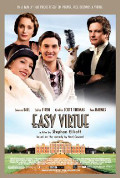
Directed by
Stephan Elliott
95 minutes
Rated M
Reviewed by
Bernard Hemingway


Easy Virtue (2008)
Synopsis: Just after the end of The Great War a young English blueblood (Ben Barnes) marries a glamorous American racing car driver (Jessica Biel) and brings her home to the crumbling family estate to meet his parents (Kirstin Scott Thomas and Colin Firth).
Stephan Elliott has got his mojo back!. It has been fourteen years since the huge commercial success of The Adventures Of Priscilla, Queen Of The Desert and nearly a decade since his last film, an undisputed flop, Eye Of The Beholder. With Easy Virtue, loosely based on Noël Coward’s play of the same name and co-scripted by Elliott with Sheridan Jobbins, he delivers up a thoroughly entertaining film about the passing of the English aristocracy.
Call it The Jazz Age or The Roaring Twenties, the period between the end of World War 1 and the Great Depression has been a fertile ground for filmmakers with a love of visual style. From the opening credits with a faux newsreel (Biel and Barnes were cleverly photoshopped into an archival one) and Art Deco graphics spooling out to the words and music of Coward’s 'Mad About The Boy', Easy Virtue revels in its period style, part Deco chic, part faded aristocratic elegance. But the charm of the film is not just in its superb production design (achieved on relatively limited budget). Elliott, with the skilful aid of cinematographer Martin Kenzie, also beguiles us with some marvelously inventive visual devices. There is, for instance, a beautiful sequence that starts with the happy newly-weds about to make love seen reflected in a convex mirror, that morphs into a sequential portrait of the remaining family members listening intently in their love-lorn beds. My favourite moment however would be the image of Mrs Whittaker senior caught on the (also convex) surface of a black billiard ball that has rebounded back toward the camera.
If the film is a pleasure to the eye, Coward’s wit, of course, provides plenty of amusement for the mind with his barbed portraiture of English high society. Whilst I found Colin Firth a rather odd choice for the war-traumatized paterfamilias, seeming neither old enough to play the father to Ben Barnes’s John Whittaker, nor having much of the to-the-manor-born, near-inbred gentility that is de rigeur for such characters, he, like all the cast, acquit themselves handsomely. Performance-wise, however, the film belongs to the two female leads. Here Jessica Biel (her natural beauty enhanced by Charlotte Walter's costume design and the hair and make-up departments), an actress hitherto better known in the context of mainstream US film and television productions, is wonderful as the American mystery woman threatening, at least according to her new mother-in-law, the hallowed traditions of the Whittaker dynasty. And in a performance which is a kind of inversion of one of her early screen appearances, such as Brenda Last in A Handful Of Dust (1988), the quintessentially English Kristin Scott Thomas as the flinty matriarch defending her castle and the seven generations of her family’s occupancy of it against the seductive intruder and creeping post-war economic reality is equally as good.
There are any number of fine films that deal with this fascinating transitional period in English cultural history. Easy Virtue with its visual and verbal panache and its fine mix of old and new (not least evident in its engaging soundtrack with its extensive use of Coward and Cole Porter songs intercut with modern Top 40 tunes like 'Car Wash' and "Sex Bomb"), surface and depth, is a highly commendable addition to the ranks of such.
FYI: Australian director Bruce Beresford was originally attached to the project.
Want something different?





